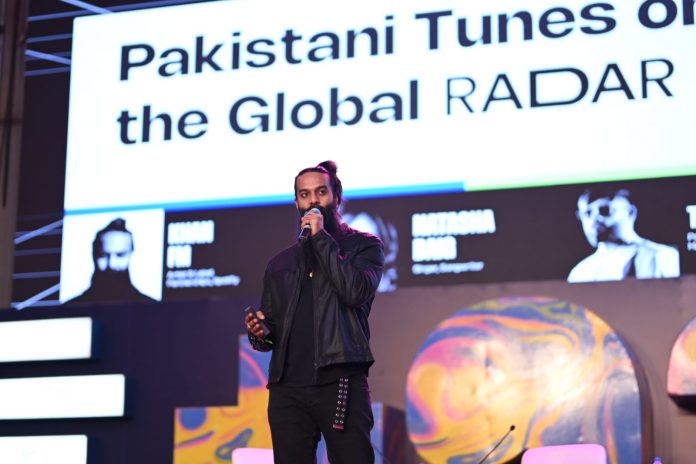Pakistan (Muhammad Yasir)
– +92Disrupt, a national tech and innovation conference designed to offer startups a comprehensive launchpad and bring together visionaries as well as innovators, recently hosted a captivating panel moderated by Khan FM, Spotify’s Artists and Label Partnerships Manager for Pakistan, Sri Lanka and Bangladesh titled ‘Pakistani Tunes on the Global RADAR’. The star-studded lineup accompanying him during the discussion included prominent artists Natasha Baig, and Maria Unera, both EQUAL Ambassadors designated by Spotify as well as Taha G, the RADAR artist for the last quarter, and Faisal Kapadia, a legend who needs no introduction.
The conversation delved into pivotal aspects of the music industry, shedding light on Spotify’s transformative impact and the collective efforts to shape Pakistan’s musical landscape.
In this insightful discussion, Khan FM passionately conveyed Spotify’s mission to unlock human creativity, emphasizing the platform’s unprecedented support for Pakistani artists. This commitment represents a paradigm shift in the industry, setting new standards and fostering a thriving creative environment.
It was also highlighted during the session that financial contributions and support for Pakistani artists have been substantial, with Spotify having paid over $40 billion to rights owners around the world including local artists. Khan FM highlighted groundbreaking initiatives like “EQUAL Pakistan,” designed to empower female creators in Pakistan, challenging traditional industry norms.
On the subject of EQUAL Pakistan, Natasha Baig, the program’s Ambassador for July 2022 highlighted the transformative impact of Spotify on Pakistani musicians, expressing gratitude for the platform’s global recognition. She emphasized the lack of a proper portal in Pakistan for artists and credited Spotify for giving the limelight to every artist, regardless of fame.
Reflecting on her personal journey, she celebrated being the first Hunzai girl featured on Times Square, noting the positive impact on her community’s perceptions of women in the music industry. Despite existing hurdles and resistance, Baig sees Spotify as a source of validation and empowerment. She expressed hope for broader audience acceptance in Pakistan, emphasizing the need for embracing diverse music genres and fostering a more inclusive music landscape.
The conversation also highlighted another notable introduction to the local music scene, “RADAR Pakistan,” a program targeting emerging artists in Pakistan through engaging mini-documentaries, showcasing the audio streaming service’s dedication to nurturing local talent.
Emphasizing the transformation of Pakistan’s music landscape over the years, Faisal Kapadia reflected on this journey, spanning from the PTV and Indus Music era to the present dominance of Spotify. He praised Spotify for transcending borders, granting global access to Pakistani music, and resolving past challenges related to piracy.
Kapadia highlighted the financial benefits brought by Spotify, enabling artists to earn legitimate royalties. He emphasized Spotify’s shift in focus from visuals to pure listening, appreciating its role in consistent music discovery. He expressed gratitude for the platform’s influence on artist consistency and the elimination of dependencies on distributors. He further acknowledged the challenges in a demanding industry, celebrated the rise of festivals like RADAR Fest, and shared a historical perspective on piracy’s role in amplifying Strings’ music in India during the 1990s.
Taha G lauded Spotify’s positive impact on Pakistani artists, highlighting the global exposure and opportunities it offers. He shared his personal experience of being signed by Sony Music through the RADAR program, underlining the platform’s role in connecting artists with a global audience. Taha G noted a significant 13 percent increase in streams after featuring on the RADAR Global playlist and expressed the surreal experience of being featured on Times Square. He emphasized the necessity of continuous campaigns to discover and promote undiscovered Pakistani talent.
Acknowledging the multifaceted nature of the music industry, Khan FM emphasized the crucial roles played by producers, songwriters, and instrumentalists. The billion-dollar potential of Pakistan’s music sector was a key focus.
Talking about the global exposure that Spotify has enabled, Maria Unera stated that she was excitedly surprised that listeners from countries like Indonesia were listening to her music. She also expressed gratitude for the diverse and transformative year facilitated by Spotify for her, noting achievements like being featured in Times Square and connecting with fellow artists. As a woman making music in Pakistan, she acknowledged the challenges, especially as a singer primarily in English, representing dual cultures. However, she viewed this as a unique aspect, appreciating Spotify’s role in increasing her following and creating a space for diverse voices. Advocating for more opportunities for women in the music industry, she urged for increased professionalism and acceptance, encouraging the allocation of gigs to female artists.
The panel discussion concluded with optimism for the future of the Pakistani music industry. Despite ongoing challenges, the focus remains on growth, improvement, and the emergence of new artists onto the global stage.







